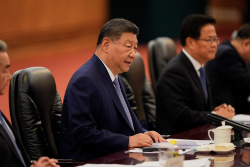
On April 4, 1968, when Senator Robert F. Kennedy learned of the assassination of Dr. Martin Luther King Jr., he was in Indiana, campaigning for the Democratic presidential nomination. Despite fears that the civil rights leader’s slaying would provoke riots—especially in cities with long histories of racial violence—Kennedy went ahead with a scheduled speech in Indianapolis, in a predominantly Black neighborhood.
His remarks are among the greatest displays of leadership, moral clarity, and emotional authenticity in American politics. Announcing King’s death to an audience, many of whom did not yet know of the slaying, Kennedy did so calmly and gracefully, acknowledging grief but urging people not to respond with hatred, vengeance, or retaliation. The 43-year-old appealed to shared values of justice, compassion, love, and understanding. He asked people to “say a prayer for the family of Martin Luther King,” but more importantly, to “say a prayer for our own country, which all of us love … for understanding and that compassion of which I spoke.”
The effect was profound. While violence broke out in many cities across the country, Indianapolis remained relatively calm that night. Many believe that Kennedy helped prevent chaos; what’s certain is that his example offered moral restraint that channeled grief into reflection, not revenge.
Fast forward to September 2025, when conservative activist Charlie Kirk was shot and killed at Utah Valley University, the reaction from Donald Trump and his senior advisor Stephen Miller was different from Kennedy’s healing mien.
Trump used polarizing language, blaming “radical left lunatics” for fostering rhetoric that he said made such violence inevitable. Miller echoed this, describing an ideology “at war with family and nature … that leads … to violence,” and pledged to use the power of law enforcement under Trump’s leadership against institutions or people deemed associated with the radical left.
Rather than emphasizing mourning, reconciliation, or internal reflection, Trump and Miller led with fear and quickly shifted to assigning blame and pressing for political consequences.
The Kirk murder has become a rallying cry—to expose the left and mobilize the base. The framing is not just “this is tragic” but “this is an example of broader threats from the other side.”
While Trump initially expressed a preference for calm, he said at Kirk’s memorial on Sunday:
“[Charlie Kirk] did not hate his opponents, he wanted the best for them. That’s where I disagreed with Charlie. I hate my opponents, and I don’t want the best for them.”
Richard Nixon, John F. Kennedy’s opponent in the closely fought 1960 presidential contest, once said, “People respond more to fear than they do to love. They don’t teach that in Sunday school, but it’s true.” Behavioral neuroscience establishes that messages triggering anger, fear, or disgust carry salience and impact that can override logical processing. In the attention economy, anger and fear get eyeballs; anger and fear sell.
It’s an unfortunate irony, and a marker of how far we have come since 1968, that Robert F. Kennedy Jr. now works for Trump, whose mentor, Roy Cohn, was chief counsel to Senator Joseph McCarthy and his witch hunts and smear tactics. Cohn was initially Robert F. Kennedy’s colleague but later became his bitter enemy. While his father distanced himself from McCarthy and Cohn’s cutthroat politics, his son, the Health and Human Services Secretary, traffics in falsehoods. He trades in fear of vaccines and has the highest approval rating of any member of Trump’s cabinet.
My father, Stephen Smith, who married Robert and John’s sister Jean, was Senator Kennedy’s campaign manager. He organized his famous funeral train, which drew mixed-race crowds to rail lines to watch his corpse travel from Los Angeles, where he was slain giving a victory speech after the California Democratic Primary, to Washington, D.C., where he would be mourned, before being buried at Arlington National Cemetery alongside his slain brother. RFK was no saint—a hard-drinking, tough man with flaws, but profoundly honorable. My uncles—Kennedys and Shrivers—were politicians and no saints either. But I know they all belonged to a time when leadership meant rising above division, finding unity in tragedy, celebrating moral courage—whether Republican or Democratic—and speaking to people’s hopes, not their fears.
In 1972, four years after Senator Kennedy was assassinated, Alabama Governor George Wallace, while running for the Democratic nomination, was shot five times in Largo, Maryland, leaving him paralyzed. One of his primary opponents, Representative Shirley Chisholm of New York, the first Black woman to run for president, made the extraordinary decision to visit Wallace at his bedside. Wallace was, of course, infamous for his 1963 inaugural declaration in Montgomery, Alabama, “Segregation now, segregation tomorrow, segregation forever.” This was not ancient history in 1972. Less than four years earlier, in 1968, Wallace’s independent, anti-civil rights bid for the White House was one of the century’s most successful third-party bids for the White House. Many in Chisholm’s circle could not understand why she would extend such compassion to a man who had built much of his career opposing civil rights.
Chisholm visited Holy Cross Hospital in Silver Spring, Maryland, about equidistant between where the attempted assassination took place and the White House itself. She entered Wallace’s hospital room quietly and without fanfare. The Brooklyn-born daughter of Caribbean immigrants, she prayed for his recovery. Later, she explained that she did this out of her Christian faith to show that her opposition to Wallace’s policies did not erase his humanity.
Wallace was moved. Later in life, he recalled Chisholm’s act of kindness with gratitude. His daughter, Peggy Wallace Kennedy, said that her father was “astonished” that someone he had so vigorously opposed, and who had every reason to despise him, would come to his side when he was most vulnerable.
Chisholm’s visit planted a seed in Wallace. In the years after the shooting, he underwent a religious awakening and publicly repented for his earlier segregationist positions. He even sought forgiveness from Black Alabamians, many of whom accepted his apology and supported his reelection.
When Abraham Lincoln called us to “bind up the nation’s wounds, and achieve and cherish a just and lasting peace among ourselves and all nations,” he left us a moral inheritance. When Kennedy showed that even in moments of national fracture, one can call for love and restraint, he deepened that inheritance. Shirley Chisolm and others, like the late civil rights icon and congressman John Lewis, and Ronald Reagan who handled the attempt against his life with grace and humor, carried that inheritance forward.
There is no evidence that left-wing violence is more common than right-wing violence. Most analyses show the opposite. If a president and his allies, during a time of hardship and pain, dehumanize others and promote hatred and division, then they tarnish the best of our political heritage. When a figure from the Kennedy family line joins a political circle where rhetoric relies on fear and dishonesty, that moral heritage is also diminished.
On that night in Indianapolis, Robert F. Kennedy, who had lost a brother to assassination, quoted from Aeschylus, “In our sleep pain that will not forget falls drop by drop upon the heart and in our own despair, against our will, comes wisdom through the awful grace of god.”
A moment of national pain and difficulty can be an opportunity for moral imagination, in Christian terms, for “the transfiguration of suffering,” the turning of hatred into compassion, understanding, empathy, even grace. It can also be a moment of stoking fear and anger for political advantage. The President of the United States is the educator in chief. He sets the moral and psychological tone for the country. It seems that Trump and his cabinet are steering towards using the Kirk killing to demonize, caricature, and persecute his political opponents. But regardless of what Trump does, we know what real leadership is and can continue to seek it.
The post Secretary Kennedy Is My Cousin. He Sounds More Like Roy Cohn than His Late Father appeared first on Washington Monthly.


 2 months ago
43
2 months ago
43 










 Bengali (Bangladesh) ·
Bengali (Bangladesh) ·  English (United States) ·
English (United States) ·